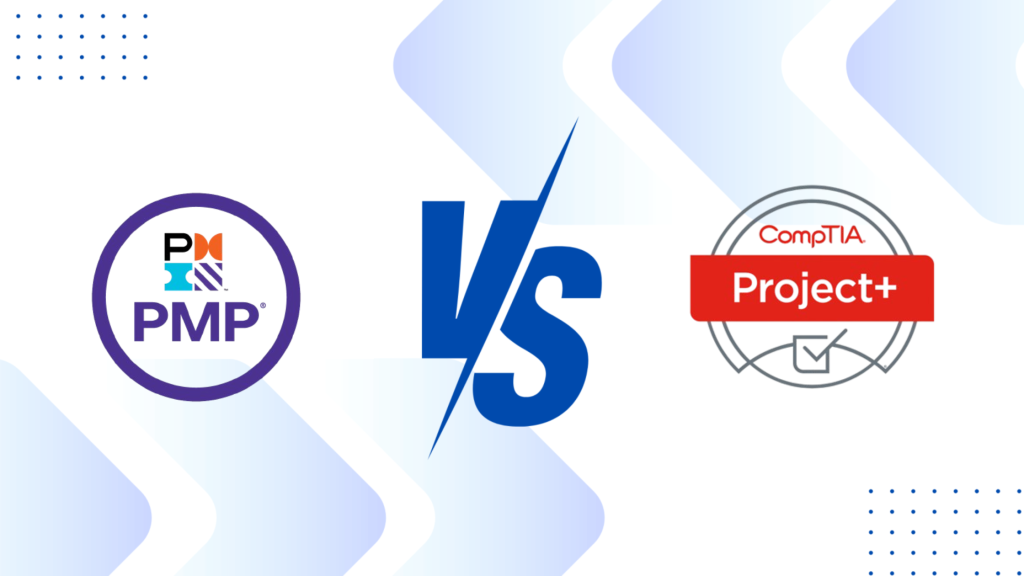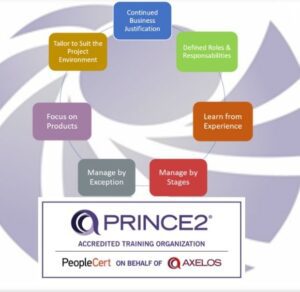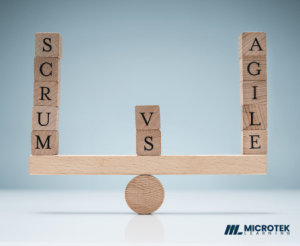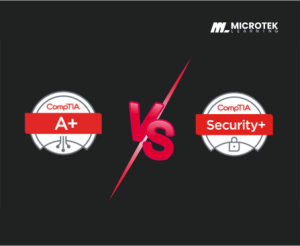
If you are like most IT workers, you have devoted a significant amount of time to overseeing team-based projects. You have undoubtedly also considered project management certifications at some point to support your credentials for your upcoming career move and to verify your experience.
Many companies are looking for qualified experts who can efficiently manage projects. Adding a few project management certifications to one’s resume will help almost anybody improve their earning potential and hone their soft skills.
However, with so many project management certifications available, you may be unsure which one is best for your needs. Moreover, some of the more well-known project management certifications may go above and beyond what is required for a position whose primary responsibility is not project management.
Therefore, to make this choice, you must be aware of each certification’s content, advantages, prerequisites, and exam format.
So, let’s take a closer look at the two most popular project management certifications: CompTIA Project+ vs. PMP.
But first, let’s start with why project management certifications are important.
Why are Project Management Certifications significant?
Project management skills enable professionals in IT and other departments to handle more projects than ever before, streamline workflows, and ensure the completion of all necessary paperwork.
Obtaining a certification is a wise way to show off your skills and set yourself apart from other applicants, whether you are new to the industry or want to advance into a project management role.
If you already have some informal project management experience, earning a project management certification can help you move into a formal project manager role by adding value, depth, and breadth to your current skill set. Furthermore, certified project managers earn more money and are in great demand.
Recent reports state that project managers who hold the PMP certification make 33% more money than those without. In the United States, PMPs earn 44% more than noncertified project management specialists. Additionally, by 2027, the global economy will require 87.7 million project management roles, which means there will be a greater demand for project management professionals, according to the Project Management Institute.
What is CompTIA Project+?
CompTIA Project+ is a highly regarded certification in the project management industry. CompTIA claims it is the only industry certification that teaches IT professionals the foundational abilities required to oversee small—to medium-sized projects effectively.
Project+ is an entry-level project management certification covering project management and IT elements.
It equips you with the business, technical, and interpersonal project management know-how required to oversee all project-related activities, including scheduling resources, creating budgets, communicating with stakeholders, and producing documentation.
For IT workers who need to oversee simpler, smaller projects as part of their job responsibilities and could use some basic project management training, CompTIA Project+ is the perfect choice. It is adaptable because it goes beyond the confines of a single methodology or framework to address fundamental project management concepts.
Prerequisites
While not required, at least 6 to 12 months of practical project management experience in an IT setting is advised.
Domains covered
- Project Tools and Documentation (18%)
- Communication and Change Management (19%)
- Project Lifestyle Phases (30%)
- Project Management Concepts (33%)
Exam Details
To get your Project+ certification, you need to pass an online test. The Project+ PK0-004 exam includes a maximum of 95 multiple-choice (with both single and multiple responses) and drag-and-drop questions.
Examinees have 90 minutes to finish the test. To pass, they need to score 710 or higher on a scale of 100 to 900.
It is administered in three different languages: English, Japanese, and Thai.
Pricing
The CompTIA Project+ PK0-005 certification pricing structure is intended to provide flexibility based on study requirements and financial constraints.
The Exam Voucher costs $369.00, with the option to finance it beginning at $34 per month through Affirm (available in the United States).
For more comprehensive preparation, the Basic Bundle costs $475.00 and includes the exam voucher, a retake, and a self-paced study guide. Financing begins at $43 per month.
The Exam Prep Bundle, priced at $591.00, adds CompTIA CertMaster Practice to the Basic Bundle’s offerings. Financing begins at $54 per month.
The Complete Bundle, priced at $1165.00, includes all of the resources from the Exam Prep Bundle as well as CompTIA Labs and CertMaster Learn. Financing options start at $106 per month.
Renewal
This accreditation is valid for a lifetime. This implies that you will never need to renew if you already hold a Project+ certification. You could, instead, concentrate on expanding your knowledge and developing your career.
Studying for CompTIA Project+
After you have decided to pursue CompTIA Project+ certification, it is crucial to plan before beginning your CompTIA training. Take a moment to think about the following:
- Are you prepared to take action?
- What is the most effective way to learn?
- How are you going to test your abilities?
There is no better place to begin preparing for a CompTIA exam than with its objectives. The new CompTIA Project+ exam’s objectives are available for free download.
Now that you have reviewed the exam objectives and determined what you already know and need to focus on, it is time to study. CompTIA provides classroom-based and self-study training options, so you can choose the one that best suits your needs.
The Official CompTIA Project+ Study Guide covers every exam objective, so you can be sure you are concentrating on the appropriate subjects. CompTIA CertMaster Labs, now available for CompTIA Project+, offers a platform to gain valuable hands-on, browser-based virtual lab environments.
But learning is only the start. It is imperative that you apply what you have learned after gaining the necessary knowledge. Exam objectives are assessed through performance-based questions on the CompTIA Project+ exam, which gauge your proficiency in completing practical tasks.
You will need to gain some practical experience to pass your certification exam. Exam Prep with CertMaster Practice offers adaptive exam preparation that will reinforce what you know and fill the gaps in areas you need to improve.
Individuals and teams can also receive in-person or live online training from top instructors through CompTIA’s extensive network of Authorized Training Partners.
Although CompTIA advises having at least six to twelve months’ worth of relevant hands-on experience managing projects in an IT setting, we recognize that many IT professionals use CompTIA Project+ as a launching pad for their careers.
After you have mastered the content, it is time to prepare for the test. It does not matter whether CompTIA Project+ is your first or tenth certification exam. If you have never taken a high-stakes exam before (or in a long time), you should become acquainted with how questions are presented and adjust to the pressure of a timed exam.
Jobs for Project+ holders
The average annual salary for a CompTIA Project+ holder in the United States is $107,124. This comes to about $51.50 per hour.
There are various high-paying jobs that you can get with a Project+ certification:
- Quality Assurance Analyst ($86,408 per year)
- Systems Administrator ($85,306 per year)
- Business Analyst ($84,761 per year)
- Project Coordinator ($56,829 per year)
- Tier II IT Support Technician ($53,679 per year)
What is PMP?
The Professional Project Management (PMP) certification is widely accepted as a prerequisite for full-time project managers and is the industry benchmark for project management. The Project Management Institute (PMI), the most esteemed project management organization, administers this certification.
The PMP recognizes candidates who excel at managing professional project teams, processes, and business priorities. PMI established the PMP to honor project managers who have demonstrated proficiency in all areas of project leadership.
It is one of the most prominent certifications for project managers and strongly emphasizes advanced competency and proficiency. Certified PMP holders demonstrate professional knowledge and skills in project initiation, planning, execution, monitoring, and closure.
This certification is intended for seasoned Project Managers at all levels who can successfully manage and complete projects of any size or complexity. Consequently, it offers project management certification, creates job opportunities, and expands the field of project management.
Prerequisites
If you hold a four-year degree, you must demonstrate that you have completed 4,500 hours—more than two years—of project management or leadership experience in addition to 35 hours of project management coursework. If you do not have a four-year degree, you must have spent 7,500 hours (nearly four years) leading and directing projects, plus 35 hours of project management education.
Domains covered
- People (42%)
- Process (50%)
- Business Environment (8%)
Exam Details
The PMP examination consists of 180 questions, five of which are regarded as pretest questions. Examinees use pretests to validate future exam questions without affecting their scores. Throughout the exam, all questions are placed randomly.
There will now be two 10-minute breaks during the PMP exam. The first will appear once you have completed questions 1–60 and reviewed your answers. The second break will start once you have answered question 120 and verified that you have gone over all of your responses.
Please be aware that you cannot go back to the questions from the prior exam section once you have reviewed your answers and begun your break. Following each break, when you sign back in, you will have time to finish the remaining sections. You will have 230 minutes in total to answer 180 questions.
The exam has two parts: an optional tutorial that takes five to fifteen minutes to complete and a survey that follows the tutorial. The 230 minutes allotted for the exam do not involve the time needed to finish the tutorial and survey.
The PMP Exam is administered in the following languages: Arabic, Chinese (Simplified and Traditional), English, French, German, Hebrew, Indonesian, Italian, Japanese, Korean, Polish (Poland), Portuguese (Brazilian), Russian, Spanish (Mexico and Spain), and Turkish.
Pricing
An exam fee is required for PMP certification. The fee for PMI members is $425.00, while non-members are charged $595.
Renewal
To keep your PMP credential and active certification status after passing the PMP® exam, you must complete the Continuing Certification Requirements (CCR) program to keep your skills current. To renew your certification after each three-year PMP certification cycle, you must accumulate 60 Professional Development Units (PDUs). A fresh three-year cycle commences after you have effectively finished the previous one.
The day you pass the exam marks the start of your first certification/CCR cycle. The third anniversary of your exam pass marks the end of your first certification/CCR cycle. Therefore, you must renew your PMP certification one day prior to the third anniversary of passing the test.
Studying for PMP
Try PMI’s online course for on-demand PMP exam preparation. It prepares you for test day by applying concepts, principles, and real-world scenarios. Because the On-Demand PMP Exam Prep course is self-paced, you can complete it whenever convenient.
This course fulfills the 35 hours of training required to apply for the PMP certification.
You can also use 175 practice exam questions to assess your knowledge and readiness for the PMP certification exam.
Additionally, PMI’s Authorized Training Partner program links you to organizations that align with PMI and help you prepare for the PMP certification exam. All Authorized Training Partners utilize training materials created by PMI. The instructors hold valid PMP certifications. They always strive to improve their project management abilities and stay up to date on new learning methods. This is a fantastic choice if you get more benefit from in-person conversations.
Here are some points to keep in mind:
- Use the Application Checklist to determine if you are prepared to apply.
- Examine self-study guides that have been released by other respectable training companies.
- Check out the PMI Certifications Handbook.
- Enroll in a formal study program provided by authorized Authorized Training Partners or PMI chapters.
Check out PMI’s website for more information.
Jobs for PMP holders
PMP certification salary statistics demonstrate that this certification is worth the hard work for many professionals. PMI states the median annual salary for US project managers without PMP certification is $93,000. PMPs earn a median salary of $123,000 annually, a 32% increase over their noncertified counterparts.
There are numerous high-paying jobs for PMP certification holders:
- Portfolio and Program Manager ($168,460 per year)
- Engineering Project Manager ($160,405 per year)
- Product Owner ($160,300 per year)
- Project Director ($151,962 per year)
- Project Manager Consultant ($151,125 per year)
- Project Coordinator ($56,829 per year)
Which one should you choose: Project+ vs. PMP?
Choosing which project management certification is best for you can be challenging. However, here, we will make it easier for you to decide.
There appear to be two types of project management certifications: ones intended for full-time project managers and others for individuals in other positions who handle projects on the side.
If you manage projects in addition to your primary IT role, CompTIA Project+ can help you grasp project management concepts without requiring you to invest the time and money required for major project management certifications. It is perfect for professionals who oversee less complicated, smaller projects as part of their other responsibilities but still require a foundational understanding of project management.
On the other hand, PMP is a framework/methodology-specific certification meant for experienced project managers in charge of major undertakings. PMP may be a good fit for you if you work as a full-time project manager.
The decision between Project+ and PMP® will mostly depend on the kind of work you currently do and the length of your experience, even though both certifications are highly respected and will strengthen your resume.
When it comes to prerequisites, PMP has stricter requirements. For example, an applicant must have completed a four-year degree or equivalent and at least 4,500 hours of project leadership experience, or 7,500 hours if they hold a second degree.
In contrast, CompTIA Project+ has no set guidelines and does not require any particular prior experience or certifications, making it ideal for novices entering the industry.
So, what is the catch?
If project management is not your primary professional focus, you should pursue the CompTIA Project+ certification. It is highly regarded and undoubtedly easier to obtain than any of the two PMI certifications.
If your goal is to become a legitimate full-time project manager, you should pursue the PMP certification. The Project Management Professional certification may be your best option (depending on how many years of project experience you have).
This table will help you understand better:
| CompTIA Project+ | PMP | |
| Certification Overview | For IT professionals who would benefit from basic project management skills and are required to oversee smaller, less complex projects as part of their job responsibilities. | For project managers working full-time, a globally recognized professional credential in project management. |
| Duration of exam | 90 minutes, one exam, with a maximum of 90 questions | 200 questions on one exam, 240 minutes |
| Expertise level | Entry-level | Intermediate |
| Exam Subject Matter | Projects that are small or medium-sized | Medium-sized to large-scale projects using the PMI methodology |
| Qualifications | Although not required, it is advised to have at least six to twelve months of practical experience managing projects in an IT environment. | An undergraduate degree, 4,500 hours of project leadership and direction, and 35 hours of project management training are required in addition to application. |
| Price | $369 | $425 for PMI members and $595 for non-members |
| Domains | Project Management Concepts (33%)Project Lifestyle Phases (30%)Communication and Change Management (19%)Project Tools and Documentation (18%) | People (42%)Process (50%)Business Environment (8%) |
| Learning Resources | CompTIA CertMaster LearnThe Official CompTIA Project+ Study GuideCompTIA CertMaster PracticeCompTIA CertMaster Labs | The Project Management Body of Knowledge (PMBOK® Guide), the PMP handbook, the PMP examination content outline, and online or classroom instruction. |
Final Thoughts
It is really hard to go wrong with earning a certification in either of the two project management programs—PMP vs. CompTIA Project+. What kind of job you have and how much time you have to pursue the certification before applying for a new job may determine which certification is best for you.
Though everyone has different requirements, it is crucial to ensure that you are ready for a certification test.
So, now is the ideal time to contact Microtek Learning and discuss the various project management certification course options if you are interested in developing your project management skills and abilities.
Frequently Asked Questions: CompTIA Project+ vs. PMP
Is Project+ the same as PMP?
PMP may be appropriate for you if you manage projects full-time. CompTIA Project+, on the other hand, can assist you in understanding project management if your primary position is in IT and you manage project management concepts without putting in the time and money that major project management certifications require.
Is CompTIA Project+ worth it?
Those looking to work in the IT industry in project management may find the CompTIA Project+ Certification helpful. Notwithstanding its shortcomings, CompTIA Project+ is valuable because it provides improved career opportunities and skill development. Determining if CompTIA Project+ is worthwhile requires carefully assessing each person’s situation and objectives.
What is the difference between CompTIA A+ and PMP?
As an entry-level certification, the CompTIA Project+ Certification was created with beginners in project management and those with the least amount of experience in the field in mind. The PMP is primarily intended for project managers with experience.
Which project management certification is most respected?
The PMI’s Project Management Professional (PMP) certification is the most popular and well-known. PMI also offers several other certifications that are appropriate for individuals at various stages of their careers.



